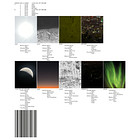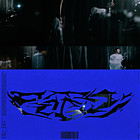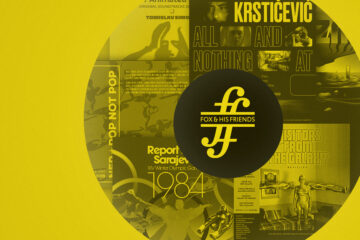Chances are you have heard the name Squama in the context of Enji’s »Ulaan.« The Mongolian singer’s sophomore album received glowing reviews from The Guardian, The Washington Post, and plenty of jazz magazines for Enkhjargal Erkhembayar’s intimate, idiosyncratic take on vocal-led jazz. Martin Brugger and Maximilian Schachtner are quick to point out that the album wasn’t an »international hit« in terms of sold units though, but that they are glad for the attention it got—especially for the artist, who came late to the genre and properly started her career in it after moving to Munich, which is also where Squama and most of its artists are based.

I Can Feel My Dreams

Nant

Six Pieces For Solo Violin

Ulaan Black Vinyl Edition
The duo leading it—multi-instrumentalist and producer Brugger is responsible for the music side, while Schachtner is in charge of the striking-yet-tasteful visual presentation—has turned the label into somewhat of a full-time job by now, but still barely make any money with it, as they say. Squama is the archetypical indie label in regards to how it was founded: When no other label wanted to release the debut album by Brugger’s band Fazer, they put it out themselves as a DIY release and for the release of its successor officially founded Squama in 2019.
A certain multidimensionality
The multi-genre band with two drummers has since gone on to release its music through City Slang, however members such as percussionist Simon Popp have remained staples in the Squama cosmos. The affiliated artists’ broad tastes and interests results in a sprawling mix: Recent releases have included a collaboration between rising deep techno star Polygonia with Popp, but also intricate compositions for Teresa Allgaier’s violin by Sophia Jani and Damian Della Torre’s lush electro-acoustic ambient reveries on albums such as the recently-released »I Can Feel My Dreams« that sound as they would be just as home on RVNG Intl. or Leaving.
When asked what they’re looking fo in their A&R workr, the label owners speak in abstract terms: »A certain multi-dimensionality is important to us, and also humour, a sense of ease, and intuition,« they say. You needn’t scour through the label’s back catalogue—though that certainly doesn’t hurt—to understand what these somewhat esoteric descriptors mean in the context of the label: Taking a look at the different cover artworks will also do the trick. From the lush, mysterious subdued palette of the cover of Enji’s »Ulaan« to experiments with typography and even a winking riff on the iconic »Blue Monday« sleeve design for Julian Klaas’s »Impromptu,« the records always look just as colourful as they sound.
»The term Squama refers to the patterns formed by fish scales«.
This is of course no accident in the case of a label that was co-founded by an experienced designer, and in fact even the name already illustrates how the two owners consider the musical and visual aspects to be sides of the exact same coin: »The term squama refers to the patterns formed by fish scales,« they explain and point out that this is what you see on the cover of the label’s inaugural LP, Fazer’s »Nadi.« They also quote Manfred Eicher of the legendary ECM imprint who has called the label’s striking artworks »invitations« rather than illustrations of the music itself. »However, unlike ECM who do not use neutral artworks, but invest a lot of time to find a suitable visual translation.«
The spirit of collaboration
Squama’s manifold connections to the world of design and visual art have resulted in many different ventures. Through his work Schachtner got to know Robert Eikmeyer from Brigade Commerz, the publisher with whom Squama collaborated for a release of »I was born under a wand’rin’ star« by in/famous German artist Martin Kippenberger as well as two follow-up release in the label’s SQMX series by Oliver Augst with none other than Raymond Pettibon, himself the illustrator and designer of some of the most iconic album artworks and band logos in music history.
The ambitious series—featuring Pettibon’s take on songs by Charles Manson and Eden Ahbez—is further proof that the connection between music and visual arts is not a one-way street at Squama. »We have a holistic understanding of albums in the sense that music, artwork, videos, and photos are interlocked and represent different levels,« the owners explain. »Which for us is less about viability than about culture in itself. We want the music and the objects we produce are good, even if that means we have pay a bit more to make them happen.« This holistic approach is even at play when the label gets a chance to shamelessly promote itself.
»We have a holistic understanding of albums in the sense that music, artwork, videos, and photos are interlocked and represent different levels«.
For the recent exhibition »Squama: B-Sides« in Tokyo’s print gallery, Schachtner and Brugger wanted to do more than just put some record covers on display. »Analogous to the remix principle as it is applied in music, Max asked other designers with whom he is friends and/or whose work he admires to create new pieces from the existing Squama archive,« Brugger explains. The resulting exhibition then brought together ten artists from different countries to foster a non-hierarchical exchange, as the label owners emphasise. »It’s just like with music-making, which for us is mostly a collaborative thing,« they say.
This is also true for the label’s most internationally recognised artist, Enji, who will return to Squama this summer with long-time collaborator and Fazer member Simon Popp. Following up on 2022’s highly sought-after »031921 5.24 5.53« EP will be their debut proper as Poeji. »Nant« is not quite what you’d expect if you’ve heard only the former’s albums, but the duo’s mysterious take on what a few years ago would have been called dark jazz, featuring glossolalia vocals and simple, yet elegant percussion is exactly what Squama as a whole is all about: a holistic approach to things, dedicated to culture over viability.









